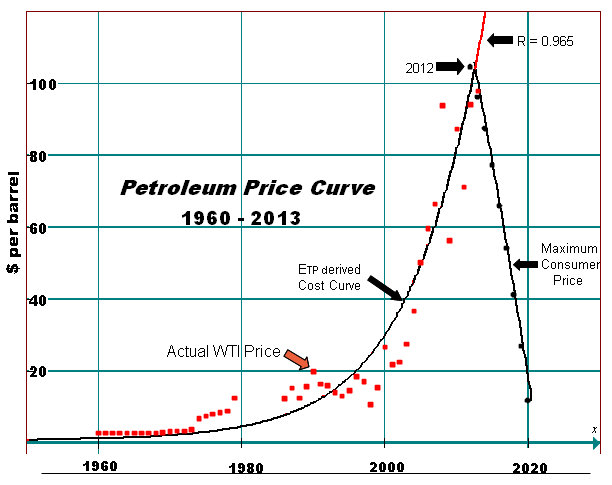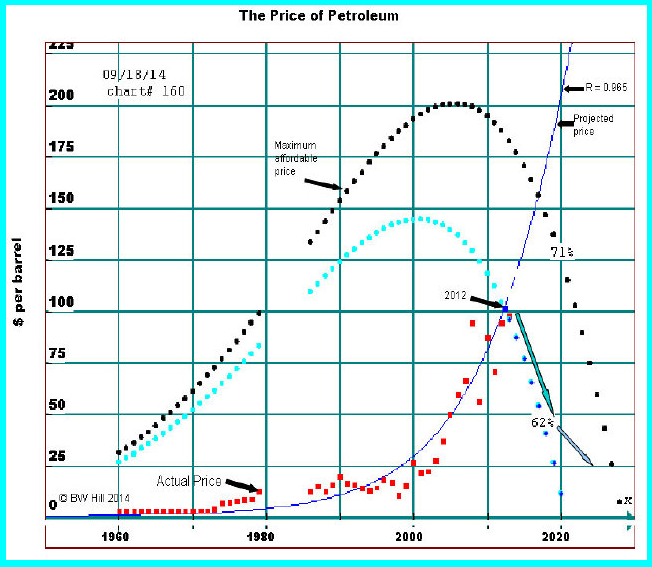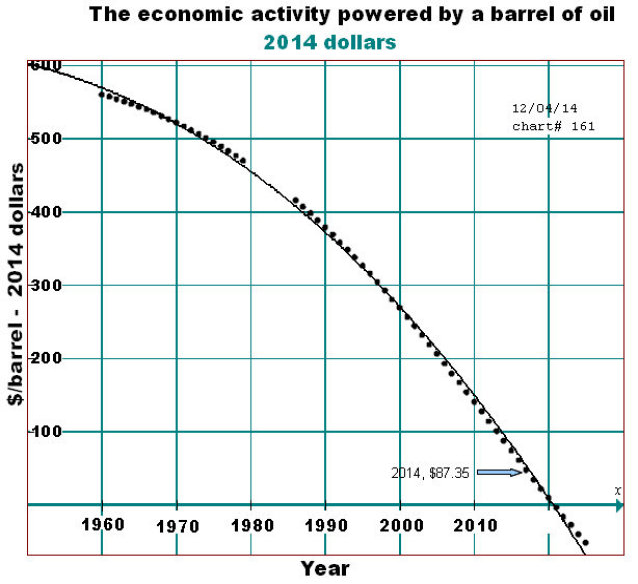Hello physics guys. I recently ran across an amazing physics model of the thermodynamic life cycle of oil production.
The entropy production of the oil production system is derived through the solution of the Entropy Rate Balance Equation for Control Volumes. The Etp function generated is an accurate predictor of historic and future oil prices, production, and the depletion status of the world's oil reserve.
I tried to present this model on another thread, but it obviously belongs here where the smart people are.
Please look this over and let me know what you think. Thanks.
http://www.thehillsgroup.org/
Depletion, the Fate of the Oil Age
Only by triggering the imagination can we begin to appreciate the statement: "we live in a civilization powered by oil". If petroleum were to disappear from our lives we would no longer recognize the world in which we live; nor would we have the slightest notion of how to exist in it. For the continuance of modern society, petroleum is an essential commodity.
To satisfy our ever expanding need for petroleum and its products, a vast interwoven worldwide work force labors arduously to extract, process, and distribute it. They work around the clock to ensure our supply. Battling against the hand maiden of resource extraction, depletion, their labors grow ever more difficult as time progresses. Each year the world's petroleum industry lifts, forces, and pumps four and one-half billion tons of water, and crude oil from almost a mile below the surface. Each year the the water portion grows larger, and the oil less. The depletion of petroleum is continuing - and it is on a relentless march toward its completion!
Depletion is the inevitable consequence of resource extraction. As petroleum depletes it reaches a point where its ability to power the economy begins to decline; as the economy declines our ability to produce petroleum, and its products declines. The objective of this study is to determine when that point will be reached, and how the decline event will evolve.
...
The world's crude reserve can be likened to a car battery. As time progresses the battery's internal irreversibilities increase due to entropy production, and we say the battery "gets weak". The internal resistance of the battery increases until the power production of the chemical processes of the battery can no longer overcome the resistance. We say the battery has "gone dead". Like the battery, the internal irreversibilities due to entropy production, of the world's crude oil production system are increasing. Higher viscosity, increasing well depth, and increasing water cut have the same effect as increasing resistance does in the battery.
All processes approach an equilibrium state with their environment. This is called the "dead state", and represents the point where no additional work can be extracted from the system's energy. It is the point where the system's internal irreversibilities overcome the system's energy. The car battery reached the "dead state" when it permanently went "dead". So also will the world's petroleum production system.
The "dead state" can be determined from the fundemental properties of petroleum, its cumulative production history, and a few First and Second Law statements. Once identified it can be used as a benchmark to assertain the world's crude oil depletion state. Answers to some very important questions then become available to us. Questions like:
1) How much of the world's remaining crude oil reserve can be extracted,
2) How long is it going to last,
3) What is it going to cost?
~The Hills Group
---Futilitist
The entropy production of the oil production system is derived through the solution of the Entropy Rate Balance Equation for Control Volumes. The Etp function generated is an accurate predictor of historic and future oil prices, production, and the depletion status of the world's oil reserve.
I tried to present this model on another thread, but it obviously belongs here where the smart people are.
Please look this over and let me know what you think. Thanks.
http://www.thehillsgroup.org/
Depletion, the Fate of the Oil Age
Only by triggering the imagination can we begin to appreciate the statement: "we live in a civilization powered by oil". If petroleum were to disappear from our lives we would no longer recognize the world in which we live; nor would we have the slightest notion of how to exist in it. For the continuance of modern society, petroleum is an essential commodity.
To satisfy our ever expanding need for petroleum and its products, a vast interwoven worldwide work force labors arduously to extract, process, and distribute it. They work around the clock to ensure our supply. Battling against the hand maiden of resource extraction, depletion, their labors grow ever more difficult as time progresses. Each year the world's petroleum industry lifts, forces, and pumps four and one-half billion tons of water, and crude oil from almost a mile below the surface. Each year the the water portion grows larger, and the oil less. The depletion of petroleum is continuing - and it is on a relentless march toward its completion!
Depletion is the inevitable consequence of resource extraction. As petroleum depletes it reaches a point where its ability to power the economy begins to decline; as the economy declines our ability to produce petroleum, and its products declines. The objective of this study is to determine when that point will be reached, and how the decline event will evolve.
...
The world's crude reserve can be likened to a car battery. As time progresses the battery's internal irreversibilities increase due to entropy production, and we say the battery "gets weak". The internal resistance of the battery increases until the power production of the chemical processes of the battery can no longer overcome the resistance. We say the battery has "gone dead". Like the battery, the internal irreversibilities due to entropy production, of the world's crude oil production system are increasing. Higher viscosity, increasing well depth, and increasing water cut have the same effect as increasing resistance does in the battery.
All processes approach an equilibrium state with their environment. This is called the "dead state", and represents the point where no additional work can be extracted from the system's energy. It is the point where the system's internal irreversibilities overcome the system's energy. The car battery reached the "dead state" when it permanently went "dead". So also will the world's petroleum production system.
The "dead state" can be determined from the fundemental properties of petroleum, its cumulative production history, and a few First and Second Law statements. Once identified it can be used as a benchmark to assertain the world's crude oil depletion state. Answers to some very important questions then become available to us. Questions like:
1) How much of the world's remaining crude oil reserve can be extracted,
2) How long is it going to last,
3) What is it going to cost?
~The Hills Group
---Futilitist
Last edited:



